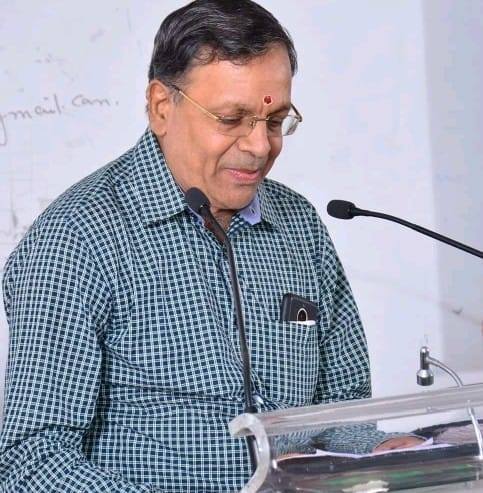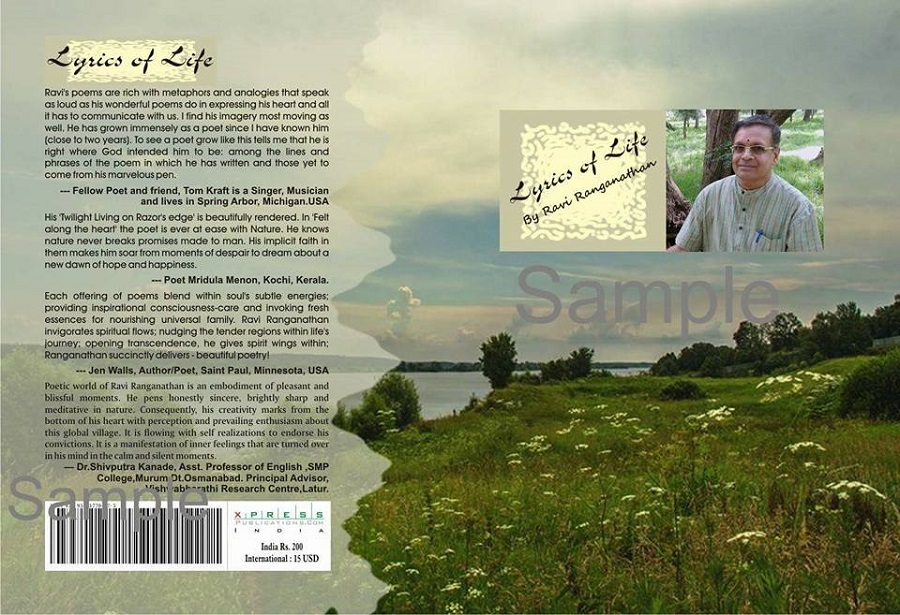By
Bhaskaranand Jha Bhaskar
LYRICS OF LIFE is a collection of seventy beautiful poems by Ravi Ranganathan, a banker turned poet. In the poems showcased in this book, he presents vivid pen pictures of life, love and nature, in addition to a few poems veering around some of contemporary issues of the world. Prof. Satish Kumar, in his Foreword to the book, truly writes- ‘Ranganathan’s poems reflect his experiences—both spiritual and temporal- and his close and minute observation of life and nature.’ As a matter of fact, he romances with both spirituality and nature and derives aesthetic pleasure. His poetry demonstrates a mystical relationship with nature. With his imaginative power duly supported by his experience he wishes to transcend his everyday life and troubles so that his soul can connect with a spiritual essence or something divine. His poetry is scintillating articulation of wide ranges of his experiences of life, with haunting youthful exuberance, and ‘stray thoughts of every hue’. He is very candid in saying that even thoughts need a container to be stored in and poetry is the best way to conserve and preserve them. In his short poem “Flowering” he opines:
My content in thoughts remains filtered, retained for long…
I let them be… they are safe where they are…
Thoughts too need shelter…
You need a drought before a rousing rainfall…
The Anthology begins with “Hallucinate Me”, a moving tribute to mother. The poem deals with fond and loving memories of the poet’s mother whose love and affection haunts the poet. Karmic connotation brings to the fore his philosophic aspect of his personality. The poet’s sense of loss in form of missing his mother is undercurrent in the following lines:
Miss you Amma, miss you so much…
If God punished your innocence
With karma of hallucination
Hallucinate me too Oh! God
That I may share what you suffered;
That I may be in communion with you
Every day, till the death day…
Elegiac note of his poetry is reflected in his next poem Epitaph for a Sanyasi”. Here he gives a realistic account of a sage who with ‘divine gnosis’ ‘lived knowing not he LIVED’. Here again, his philosophic acceptance of karmic causes and effects is palpable. To the poet, the death of the sanyasi doesn’t mean ‘the end of a game’ rather deliverance of spirit from the physical frame. He considers death as a door to divine life. ‘Sweet’ and ‘salt’ symbolise joy and sorrow of life which act as a hymn to soul.
Ravi Ranganathan is a poet of spirituality and mysticism. His poetry is a kind of exploration in the realm of spiritualism. His wide experience of life, particularly in the spiritual world finds a wonderful manifestation in some of his poems. Poems such as “Sadasiva Samarambham”, “Devi Kamakshi’s Kataksh”, “The Cosmic Rhythm” etc are brilliant in this respect. In these poems he expresses his spiritual quest. In “Devi Kamakshi’s Kataksh”, he himself reveals:
My search is not my poems but Love,
Joyously showered from your Bliss above.
The romantic impulse coupled with his spiritual leaning is enough to stir his soul for the realization of divine bliss. He further says:
My love begins lives and ends with you;
Grant me boon to meditate you through and through
My wish fulfilling tree hewing a path from heaven
Bless me with a glance of your merciful kataksh
Even as I savour the very last drop of divinity
From the ocean of your seamless, Kindly trance
My thirst remains unquenched,
Entrenched in timeless stance…
“The Cosmic Rhythm” is the secret code of his spiritual awareness. The poet’s spiritual awareness emanates from the beauteous nature with ‘tranquilizing twilight time’, with humming melody of river. He becomes meditative and reflective and it leads him to ‘spiritual green’ with eternal Peace and Bliss. Like sages and saints, he also seeks ‘salvation’:
Crisscross currents of patterned waves
forming an edifice of encircled enclaves…
thoughts seek the shelter of cosmic caves
to see light, truth
ere you reach graves.
Some poems of Ravi Ranganathan are soul-searching and the outcome of his spiritual musings over the earthly life and the beyond. He probes into human psyche and finds the way to transcend the mundane. He undertakes his journey into his inner shelf and opens the ‘muted self’, through his ‘intense meditation’ that acts as a linking thread. “Inner Engineering is a soul-searching poem in which he avers that he-
Could see light from my inner eye rising from the urn
grip and hear my inner voice hone-
‘you got to take The long journey alone
fathom strengths lying deep within your throne’…
Seeds of journey of reading me just sown…
In another poem “Submerge Me” dealing with eternal quest for realizing self, he wishes to be cradled ‘with cadence of that immortal tune/ that lets submerge in painful swoon’. Seeking the company of his love along this journey, he prays:
Lend me a hand in myopic mood
when I trudge solitude’s road….
that, hand in hand, transcending the mundane
we may leap beyond sand into the mystique moonshine…
His poetry is remarkable for his fascination with and his love for nature in all its facets. As a poet of nature, he presents beautiful pictures of nature through his poems. He perceives divine manifestation in objects of nature. For him, seasons matter much more. His poem “Autumn is always my Spring” personifies seasons as his beloved and soothingly feels loved in her lap. He expresses:
I read the pages of her eyes…
We decided to pull and hang together
When in youth’s abject submission
Lay featured Life’s fairy tale fusion.
In me she sought her wondrous wing;
So autumn is always my eternal Spring.
An immense influence of Romantics is considerably palpable in Ravi Ranganathan’s poetry. He wonderfully portrays picturesque and enchanting beauty of nature which is much more appealing. His treatment of nature in his poetry is really appreciable. His poem “Felt Along the Heart” is Wordsworthian in tone and tenor. Like Wordsworth, he also expresses his mood:
I sit back, reclined in thought
in silent orchids of memory
sipping quietness and that tranquil scene…
That day, while exuding eerie muteness
the mountains threatened
to haunt me with its mystique physique;
It does so still..
His engagement with nature goes a long way in enabling him to perceive the divinity behind every object of nature. Mesmerized by the scenic beauty and its aesthetic flow he gets reflective and introspective. While observing moods of nature, he makes experiments with the ultimate reality. He feels ecstatic and wondrous at the latent divine force of nature and feels it ‘along the heart’
Wonder how such feelings in nature
merge with the inner muse and nurture
evoking evenings of Cosmic Consciousness…
“Orphaned Summer Breeze”, “Owning The Sunset”, “Dusk”, “Beware”, “Core Inner Joy”, “Cygnets In The Pond”, “Fugitive Unbound”, “He Rows The Rainbow Yacht”, ”Mine Over Matter”, “Nocturnal Niche”, “Remnants” ,Ruptured Ripples”, “A Sheath- Not A Mirage”, Smile”, The Bird I Love My Best”, “The Flower and The Glory”, Volcano”, “His Life, His Earth”, “Whimpered Whispers”, “Waves Unabated”, “When the Clouds Came Home”, “Wrath of the Earth”, “Deadly December Deluge” etc are some remarkable poems about nature and its beauty and bounty.
The poetry of Ranganathan is marked with a note of melancholy and pessimism. Nevertheless, it has positive and optimistic strains. The poet is saddened to see the ‘ceaseless craving within’ the people. For the trivial, they are simply wasting their life. However, he believes in the positive translation of external despondency into inner buoyancy which is possible only after creative musings over vicissitudes of life. The poet is well aware of all the vagaries of the world. In the insightful poem “Ahead”, he comes up with a beacon of philosophic thoughts to dispel all the gloom and darkness. Following lines from the said poem highlight his thoughts on vanity and futility of such useless cravings and longings:
By gloom and dark woefully riven,
frightened, unhappy, the soul is driven
to the verge of venomous thoughts.
–pensive mood
and countless musings;
Fame and glory will fade into dust,
vain existence preceding vain death!
With strains of deep philosophy of life negating the vanity of the world his poem “Singleness” is equally remarkable. He seems to be celebrating the solitude and nothingness which makes the people insightful and reflective. The thematic significance reminds us of Shakespeare’s ‘Life is a tale/Told by an idiot/Full of sound and fury/Signifying nothing’. The following concluding lines of the poem have a Shakespearean touch but with a slight difference in approach:
What a sweet aftermath!
In quest of merging
with Oneness,
effulgent in my
aloneness
am enjoying my nothingness…
Some of his poems demonstrate his notion of romantic love. His heart is so soaked in purity of Platonic love that he recalls his muse even in the autumn of his life as she has been a great source of emotional succour through thick and thin. His love is not demanding or selfish. In the poem “Being There For Me”, the poet lays bare his heart while counting all those precious moments of love he felt and still feeling:
O my friend, my pride, my guide…
Oh my tried, trusted, selfless flame
ever by my side.. never staking a claim…
How will I ever prove
as I bare my heart
that I TOO AM THERE FOR YOU…
In another poem “Reminisce in Your Absence” dedicated to his” special someone” who cares and creeps in all his thoughts, he expresses his overwhelming gratitude to her:
I owe so much to you….
That blade of grass gloats,
This cheery flower commutes
It is the cares of your comfort
in them that floats,
your invisible steps that roots…
You are the shadow in my path
treading gently, decisively
in unobtrusive aftermath…
Like other poets of love, he is not swayed by the tornado of impulsive, passionate love. He rather has a practical approach to both love and life. He advocates the synergy between the two. He regards “loss” in love as “vain pain”. Ye attaches more importance to living life full as he believes, love is just a means. The poem “Unshared” is a testimony to this philosophy of love he has developed in course of matured evolution of his poetic and philosophic personality. He frankly expresses his realization:
I woke up from my naiveness
sensed derailment round the corner
Realized LIFE is larger than Love…
Am grateful for the bliss
of those unshared moments…
“Synthesis” is a romantic poem on the beautiful play of nature suggesting the union of love. Natural imagery employed in this poem is stirring, suggestive and evocative. The poem reminds us of Shelley’s celebrated poem “Love’s Philosophy”. Every object of nature craves for another for the unison and in the process their enduring, untiring and ongoing strives never stops. The poet, here, beautifully describes the romance of the union in the world of nature- shores enjoying the beauty of waves, Sun playing with rains, rice cuddled in the husks, leaves embraced by the flowers, pebbles on the bed of rives, breezes kissing trees etc. This scenic beauty of nature develops his longing for his beloved. He appeals to his beloved:
Come my Love, come
Why we should not sync in each other’s thoughts
and reciprocate synthesis of Nature’s Bliss…
The poet very adroitly blends the two pattern of creative expressions in his poetry- the cosmic creation and the poetic creation; both forming the same dominant center- the Divine Power. He makes apt use of ‘rainbow’ and “”twilight sky” as a stirring and powerful metaphor and presents his well-formed pattern of thoughts in the poem “He Rows The Rainbow Yacht”. He says:
Rainbow is a kaleidoscope of seven colours
Poetry too is pattern to shed contours…
With a beautiful and befitting comparison he further reiterates the oneness between the two with the same message of developing appreciative faculty and approach to the Creator:
They weave images in rows and rows
cusps of designs and fascinating eerie trends…
Words too work within its sinews and bends
lisping into a feeling that transcends
mundane emotions and elevates as it transcends…
It is the same Power which creates the rainbow yacht
that weaves our web of thought…
Sensuousness is also palpable in some of his love poems. In his poem “The Ultimate Meet” has presents an enticing example of his brilliant dexterity of evoking sensuousness, creating an elaborate visual image when ‘she moved forward/ and planted a heavenly kiss’ on his check. The poet discloses the secret to his ‘perfect romantic mood’:
We drank each other with our eyes
as our lips sipped hot tea…
Such a feeling all rationale defies.
A few poems are touching homages and emotional tributes to some important people and his dear ones whom the poet fondly remembers with due respect. These emotionally charged expressions reflect his humanitarian concerns, largeness and heartfelt gratitude to such people. “Wings of Fire will Never Tire” is a befitting tribute to Dr APJ Abul Kalam, the missile man. “Salute to Siachen Sentinel” is a commemoration of Lance Naik Hanumanthappa who laid down his life for his country. “To Sir, With Love” is a tribute to the poet’s middle school English Teacher Mr. McCann. “In Remembering My Mother” offers his love and respect for his mother as an apt emotional tribute.
Besides, his micro poems numbering 18 also arrest our attention and cursory glance for the poetic beauty and global essence well expressed with economy of words. The three, four and six liners are really a delectable read.
In this way we see that Ravi Ranganathan, in his poems, not only keenly exhibits Indian sensibility and ethos- personal, social, national, cultural, spiritual but also amazes his readers by his picturesque descriptions of beauty and bounty of nature. His wide range of experience- mystical and spiritual- adds flavour to his poetry. His diction is effective and stirring. In short, LYRICS OF LIFE is sure to reverberate in the heart of his readers throughout life, spiritualise their subjective feelings and elevate their Self to the realm of Super-Self.
Lyrics of Life, Ravi Ranganathan, Xpress Publications, Kerala, 2016 – ISBN: 978938770175
Bhaskaranand Jha Bhaskar
Bhaskaranand Jha Bhaskar is a multilingual poet (Maithili, Hindi and English), short story writer, critic and reviewer, based in Kolkata. He is regularly published in various national and international magazines, both printed and online. His poetry springs straight from heart and mind as unification of sensibility. He uses catchy lines, expressions and images. In his poetry, social issues, romance and love are tackled with equal passion. Resonant with profound spirituality and intricate mysticism his poems are stunning and enlightening, buoyant sometimes and intense at other times and always have a deep meaning beautiful enough to touch hearts of avid readers. One of his poems on Nelson Mandela is included in the academic syllabus prescribed for the school students of Philippines.
Soothing Serenades: Straight From the Heart is his first volume of poems and another one is in the pipeline. He is also a contributor to journals like The Criterion: An International Journal in English, IJML (International Journal On Multicultural Literature), The Anvil (Forum of Literature & Academic Research in English) and Harvests of New Millennium, The Interiors, Taj Mahal Review, IJES (The Indian Journal of English Studies). He is also a part of several anthologies like ‘Epitaphs’, ‘Purple Hues”, “Whispering Winds”, “Just For You, My Love”, “Heavenly Hymns”, ‘I Am a Woman”, “The Significant Anthology”, “Umbilical Cords”, “A- Divine-Madness” (Five Volumes), “Poetic Prism” – 2015 & 16, “Searching For Sublime” (Australian-Indo Poetry), “She the Shakti”, “Whispering Heart”etc.
He is also the Review Editor of Asian Signature, a literary e-journal, managed from Kolkata.




No Comments Yet!
You can be first to comment this post!